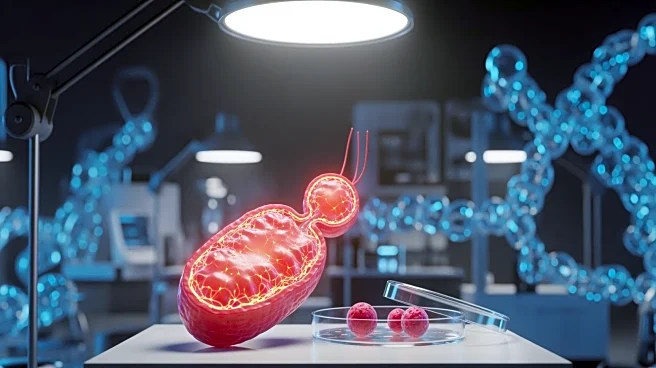What's Happening?
Recent research has highlighted the potential of stem cells in facilitating mitochondria transfer to repair damaged cells. The study focuses on mesenchymal stem cells (MSCs) and their ability to release
mitochondria-enriched extracellular vesicles (EV-Mito) through the CD38/IP3R/Ca2+ pathway. By genetically engineering MSCs to upregulate CD38 expression, researchers have enhanced the release of functional mitochondria, which can be selectively delivered to recipient cells. This process addresses limitations in traditional mitochondria transplantation, such as selectivity and loss of activity. The findings suggest that MSCs can be engineered to produce a higher yield of EV-Mito, offering a promising avenue for treating mitochondrial disorders.
Why It's Important?
The ability to transfer functional mitochondria to damaged cells has significant implications for treating mitochondrial disorders, which are often challenging due to the complexity of cellular repair mechanisms. Enhancing the release of EV-Mito from MSCs could revolutionize therapeutic approaches, providing a more efficient and targeted method for cellular repair. This advancement could benefit patients suffering from conditions like Leber's Hereditary Optic Neuropathy (LHON) and other mitochondrial diseases, potentially improving their quality of life. The research also opens new pathways for stem cell applications in regenerative medicine, highlighting the importance of genetic engineering in medical treatments.
What's Next?
Further research is needed to explore the long-term effects and safety of using genetically engineered MSCs for mitochondria transfer. Clinical trials may be necessary to validate the efficacy and safety of this approach in human patients. Additionally, the development of non-viral gene delivery vectors, like CAP, could enhance the practicality of this method in clinical settings. Researchers may also investigate the potential of EV-Mito in treating other types of cellular damage beyond mitochondrial disorders, expanding the scope of stem cell therapies.
Beyond the Headlines
The ethical implications of genetic engineering in stem cell research must be considered, particularly regarding the manipulation of cellular pathways. The potential for unintended consequences or off-target effects in gene therapy highlights the need for rigorous safety assessments. Moreover, the commercialization of such therapies could raise questions about accessibility and affordability for patients, necessitating discussions on healthcare equity.










